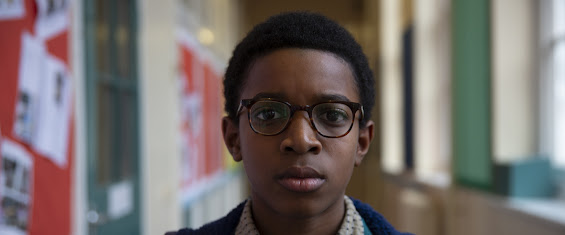Watching Education, it was incredible to see not only my own experiences reflected but also a totally unique story that reflects the specific horrors facing children of color in the British education system. Such a plight affects Kingsley Smith (Kenyah Sandy), a young child whose bright but just a touch rambunctious and still struggling to read. A reasonable assessment would be that he just needs a little extra help. The higher-ups at the public school he attends, meanwhile, see that the solution is to toss Kingsley off to a special education school that's woefully underfunded and run by educators who don't care about their students.
As Kingsley's mother, Agnes (Sharlene Whyte), soon learns, the struggles of her son play into a larger conspiracy to restrict access to higher education to people of color and immigrants in British countries. There is no chance for upward mobility in society if they're never even given the tools necessary to engage in that mobility. though Education grapples with how Kingsley is no anomaly, its scope remains squarely focused on this child and his perspective. This is a fantastic extension of how Education posits that what children need to be properly educated is a sense of commitment and direct engagement. Interact with children like they're human beings, not just objects to be tossed aside.
This is best seen in a scene where Kingsley and his abandoned class of youngsters are visited by Hazel (Naomi Ackie), a woman posing as a psychiatrist who has a much more noble purpose for visiting Kingsley's school. In her brief time in this classroom, Ackie gives Hazel a personality that's as vibrant as the brightest ray of sunshine. Ackie's Hazel just radiates kindness you can immediately believe and the way she treats Kingsley and his classmates with such humanity is an incredibly touching sight. A moment where tells one Black student, who's ashamed to be Black, that "I'm Black and I'm proud to be Black", gosh, what an emotionally stirring moment, a testament to how important it is to just exhibit kindness to kids. Oh, and McQueen also executes a perfect visual gag involving a child hiding in plain sight within a cupboard.
Keeping the scope so intimate and emphasizing the importance of human connections makes it apparent what's at stake when Education talks about the very real costs of not getting access to proper education. This systemic tragedy isn't just happening to figures who only exist for the sake of enduring misery, it happens to human beings we've gotten to know so well. The warm photography of cinematographer Shabier Kirschner cements how this is supposed to be an emotionally inviting piece. We're supposed to connect with Kingsley, his family, and all others affected by this rampant lack of education. Under the wise direction of Steve McQueen, that emotional connection is fulfilled and then some.
Such an emotional achievement is further cemented through an assortment of strong performances. Naomi Ackie is the standout of the supporting cast, but I was also left impressed by Sharlene Whyte. Her part of Agnes goes through a major transformation over the course of the story, from a strict and distant mother to one that becomes a champion for Kingsley's right to get a proper education. In the span of a 66-minute runtime, this arc could have felt rushed in the wrong hands but Whyte makes the character's growth feel organic in that timespan. It's an impressive lead performance that anchors yet another Small Axe achievement from Steve McQueen.

No comments:
Post a Comment